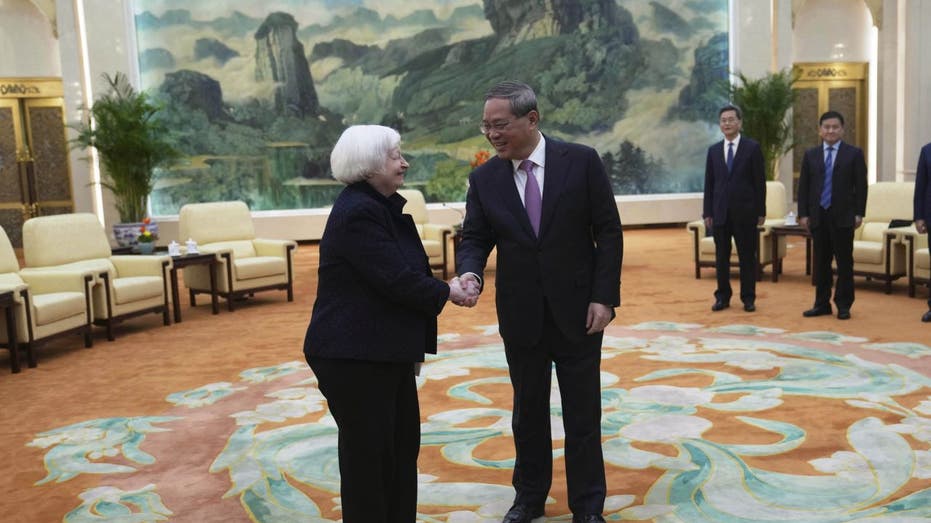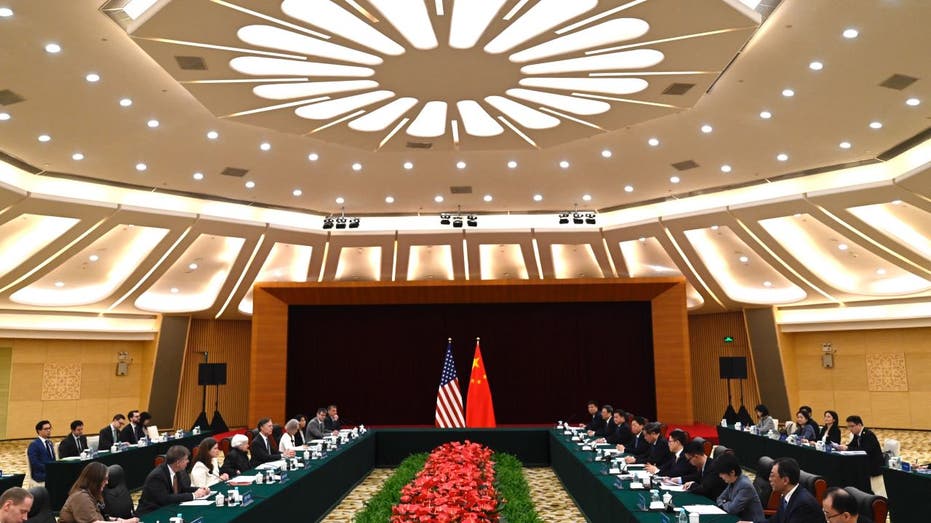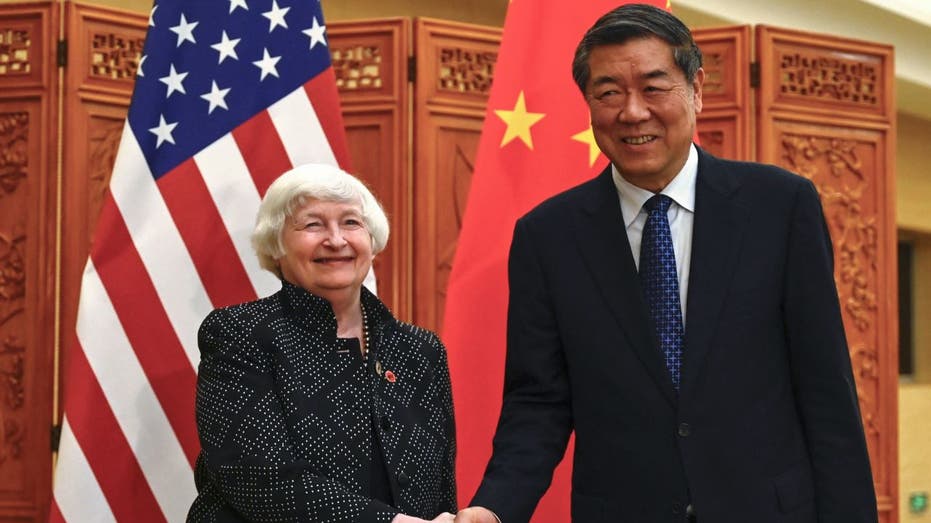Yellen says 'tough conversations' needed on China's overproduction
Yellen said the U.S. and China need to have 'tough conversation' to make progress on key issues
Yellen is the ‘quintessential China dove’ in the Biden administration: Rebeccah Heinrichs
Hudson Institute senior fellow Rebeccah Heinrichs weighs in on Secretary Yellen’s controversial trip to China during an appearance on ‘Varney & Co.’
Treasury Secretary Janet Yellen said Sunday during her trip to Beijing that the U.S. and China have a "duty" to manage the complex relationship between the countries responsibly and raised concerns about the impact of Chinese firms' overproduction in several key industries.
Yellen met with Chinese Premier Li Qiang, the number two official in the Chinese Communist Party (CCP) behind General Secretary Xi Jinping, for 80 minutes in Beijing on Sunday and Li said the U.S. and China should be partners rather than adversaries and touted the "constructive progress" made during her trip. Yellen's trip to China is her second in the last nine months.
"While we have more to do, I believe that, over the past year, we have put our bilateral relationship on more stable footing," Yellen said. "This has not meant ignoring our differences or avoiding tough conversations. It has meant understanding that we can only make progress if we directly and openly communicate with one another."
Among the issues that Yellen said the two countries need to have "tough" conversations about are China's overproduction of electric vehicles (EVS), solar panels and other clean energy components – which Yellen said have hurt producers and jobs in the U.S. and in other countries.
YELLEN VISITING CHINA TO COMBAT CLIMATE CHANGE, PROTECT INTERESTS OF AMERICAN WORKERS

Treasury Secretary Janet Yellen (L) shakes hands with Chinese Premier Li Qiang at the Great Hall of the People in Beijing on April 7, 2024. (Photo by TATAN SYUFLANA/POOL/AFP via Getty Images / Getty Images)
China's subsidies for electric vehicles have helped Chinese automakers like BYD and Geely gain market share in the world's largest car market, as well as turning China into the world's largest auto exporter with production outpacing domestic demand.
The Economist Intelligence Unit forecasts that China's battery manufacturing capacity will outpace demand by a factor of four by 2027 as the EV industry continues to grow. That rapid growth has meant that excess manufacturing capacity could be between 5 and 10 million EVs per year, according to consulting firm Automobility.
TESLA HAS NEW COMPETITION WITH A CHINESE EV PRICED LOWER THAN MODEL 3

US Treasury Secretary Janet Yellen (L) and Chinas Vice Premier He Lifeng attend a meeting at the Guangdong Zhudao Guest House in the southern Chinese city of Guangzhou on April 5, 2024. (Photo by PEDRO PARDO/AFP via Getty Images / Getty Images)
A senior Treasury Department official later said that China's excess industrial capacity and the government's support for those industries were discussed at length during the meeting, and that Li showed some willingness for U.S. and Chinese economic teams explore the issue further.
Although there were some differences of opinion, "there was not ideological or inflammatory pushback," the official said, according to a report by Reuters. "It was a much more legitimate conversation of policymakers."
Chinese state media outlet Xinhua on Sunday quoted Li as saying the U.S. should "refrain from turning economic and trade issues into political or security issues" and view production capacity from a market-oriented and global perspective.
BUYERS OF TESLA'S CHINESE RIVAL EV MAY FACE MONTHSLONG WAIT FOR SU7

Treasury Secretary Janet Yellen raised concerns about China's overproduction in several industrial areas during her visit. (Photo by PEDRO PARDO/AFP via Getty Images / Getty Images)
The outlet quoted Li as saying that China's clean energy sector, where overcapacity concerns are most acute, will support the global energy transition.
"Overcapacity isn't a new problem, but it has intensified, and we're seeing emerging risks in new sectors," Yellen said Friday in remarks during a meeting in China's southern export hub of Guangzhou.
GET FOX BUSINESS ON THE GO BY CLICKING HERE
China has doubled down on Xi's mantra of unleashing "new productive forces" through investments in cutting-edge technologies such as EVs as well as commercial spaceflight and life sciences – areas where many U.S. firms hold competitive advantages.
Reuters contributed to this report.
